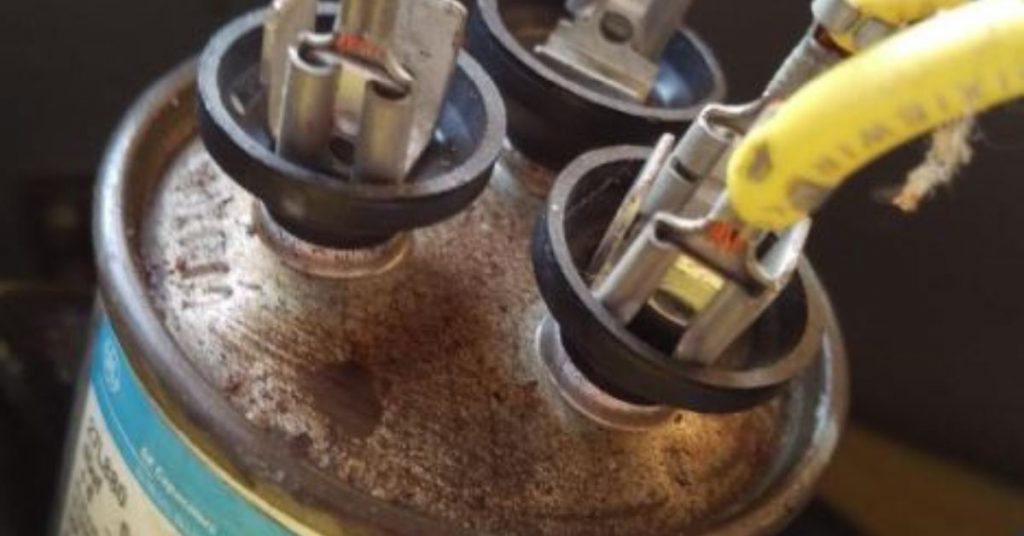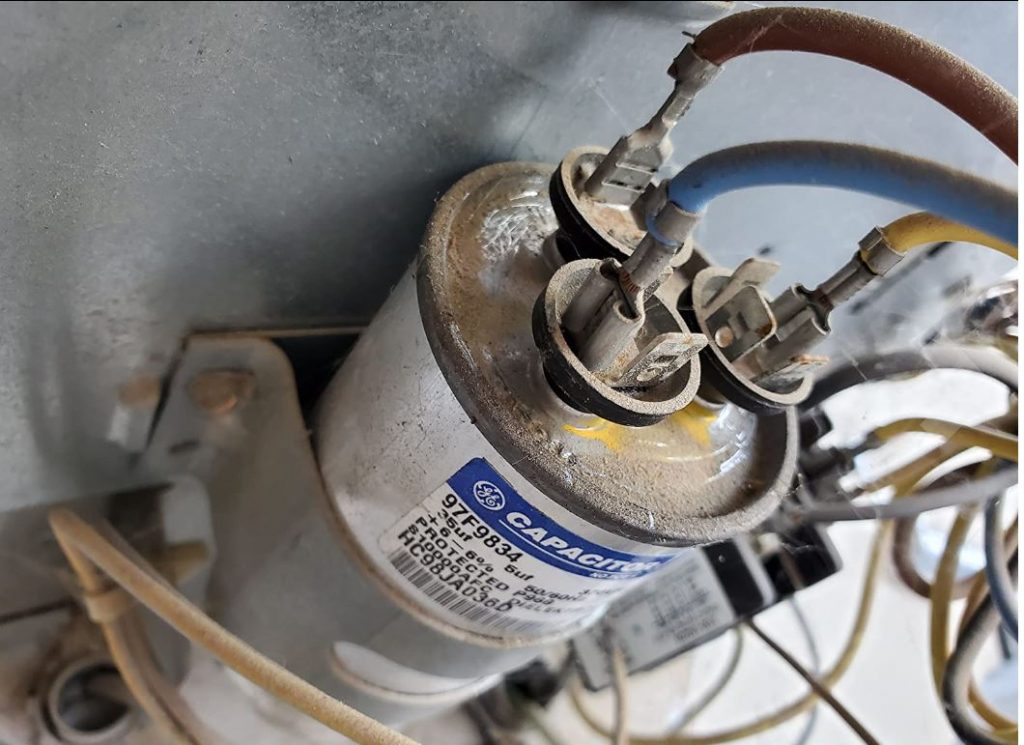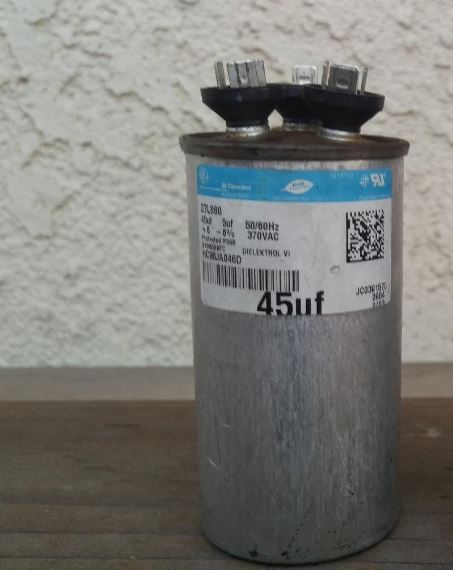
When capacitors go bad, their ability to store charge reduces significantly. As a result, the capacitors cannot supply the AC motors with the startup torque needed and the AC will therefore not start or will take too long to start, and other AC components are likely to overheat and burn out.
Here’s a summary of the common signs and symptoms that indicate a bad or blown AC capacitor:
- AC Not Turning On: One of the most prominent signs is the air conditioner not starting or failing to respond when you try to turn it on. The capacitor provides the initial electrical jolt to kick-start the compressor and fan motors.
- Humming Sound: If you hear a humming noise from the AC unit but it doesn’t start, it could be a sign of a bad capacitor. This sound typically indicates that the motor is attempting to start but lacks the necessary electrical boost.
- Warm Air Blowing: When the AC capacitor is failing, you may notice warm or room-temperature air coming from the vents instead of cool air. The compressor might not be running efficiently.
- Intermittent Cooling: In some cases, a failing capacitor can cause the AC to work intermittently. It may start and stop frequently or struggle to maintain a consistent cooling cycle.
- Overheating: Capacitors can overheat when they are failing or under excessive stress. You may notice the capacitor casing swelling or bulging, and it may feel excessively hot to the touch.
- Diminished Airflow: A bad capacitor can also lead to reduced airflow from the vents, as the fan motor may not function correctly.
- Frequent Tripping of Circuit Breaker: A failing capacitor can cause the AC to draw more current than usual, leading to the tripping of the circuit breaker.
- Unusual Odors: In some cases, a malfunctioning capacitor may emit a burning or overheated electrical odor, which is a sign of imminent failure.
- High Energy Bills: An inefficient AC system due to a bad capacitor may lead to increased energy consumption and higher utility bills.
- Visible Damage: Inspect the capacitor visually for signs of physical damage, such as leaking electrolyte or a swollen and deformed casing, which indicates it needs replacement.
Why AC Capacitors Fail

AC capacitors fail for different reasons. The following are some of those reasons:
- Power surges
- Overheating when the system works harder/longer periods of time
- Lightning strikes
- Short circuits in the system
- Use of capacitor with the wrong ratings
- Overheating due to high outdoor temperatures
- Normal wear and tear (old age)
- Not changing air filters
- Collapsed, leaking or clogged ductwork
- Low refrigerant levels
- Dirty coils (both condenser and evaporator coils)
You can prevent your AC capacitors from failing by:
- Installing HVAC surge protectors
- Change air filters after every 3 months
- Clean AC coils regularly
- If you live in extremely hot areas, consider having outside unit in a shaded are
- Increase the temperature in your thermostat
- Use the correct capacitor for your AC
- Schedule annual HVAC maintenance
How to Know If an AC Capacitor is Blown
The following are the signs/symptoms of a bad air conditioner capacitor in more details:
1. AC Won’t Start at All
If there is no cold air being supplied in the house, it means that the AC is not working. If you go outside to where the outside unit is located and notice that it is not running, you could be dealing with a bad capacitor.
As I mentioned, capacitors are responsible for supplying the startup torque to the AC motors. If the capacitor is bad, the AC will simply not turn on since motors will not run as well.
2. AC Takes Too Long to Start
If your air conditioner is taking too long to kick in then the capacitor could be dead or dying. Since the capacitor cannot supply the motor with the startup torque, it will appear like the air conditioner is hesitating to start.
I should however mention that this problem just like others we will look at can be caused by other issues. To be specific, an AC can take longer than normal to start if the refrigerant levels in the system are low.
3. An Increase in Energy Bills
Is there a sudden increase in your energy bills but you don’t know why that is the case? The air conditioner capacitor could have failed, or could be on its way to failure.
You see, when the capacitor fails, the air conditioning system has to work harder than usual. Don’t forget that capacitors do not only help AC to start and run, they also make them run efficiently. Dirty filters, low refrigerant levels, clogged ducts and basically any restriction to airflow can also cause AC electricity consumption to increase.
4. AC Turns Off Randomly
Air conditioners motor-run capacitors provide a consistent supply of charge to the motors during the cooling cycle. With a bad capacitor however, that will not happen. The motor will at some time not get the needed charge and the unit will turn off midway during the cycle and then kick in again after some time.
If your air conditioner is turning on and off (short-cycling), you may be having a bad capacitor.
5. Burning Smell from the Outside Unit
Is there a burning smell coming from your outside AC unit? Sometimes you can even see some smoke coming from the unit.
Smoke or a burning smell from the outside AC unit is a sure sign that the compressor motor is overheating. When the capacitor goes bad, it forces the motor to run longer (work harder) than it is supposed to which causes it to overheat.
The burning smell or smoke coming is from the overheating motor windings. If the AC is not turned off immediately, the motor will burn out and you will need to replace it (or the whole unit) which is not cheap.
6. Circuit Breaker Keeps Tripping
In most units, when the air conditioner starts to overheat, it prompts the circuit breaker to trip, to prevent components from burning out. As we have seen, a bad AC capacitor is more likely to overwork the system resulting in overheating.
If your circuit keeps on tripping, you could very well be dealing with a failed capacitor. The same could however be caused by other issues like short circuits in the system.
7. Humming Noises from the Outside Unit
Can you hear humming noises coming from the AC outside unit? That is caused by a motor which is trying too hard to kick in but it lacks the torque it needs in order to run. A compressor motor needs more torque to kick in than a fan motor and if it cannot get it, the motor will desperately try to start and hence the humming sounds.
Since it is the capacitor which should deliver the startup torque to the compressor motor, a humming motor is good sign of blown out capacitor.
8. AC Fan Not Spinning

Is your AC fan running/buzzing but the condenser fan is not spinning? That is a sign that you are dealing with a bad AC capacitor or bad condenser fan motor.
So which is which? There is only one way to find out. Grab a thin stick and try to manually spin the fan (from the grille at the top of the unit) by turning one of the blades clockwise and then immediately withdraw the stick.
If the fan kicks in and spins as normal, it means that you have a bad capacity. By manually turning the fan, you have replaced the function of the capacitor with your own power.
However, if the fan does not spin on its own after manually trying to spin it, you most likely have a bad fan motor. It could also be debris in the fan axle/bearing or a broken fan belt.
9. Capacitor is Swollen

To check if the capacitor is swollen, you will fist need to locate and visually inspect it. This will be out of the comfort zone for many homeowners and if you are one of them it is best to call an HVAC technician to check and test the capacitor for you, and replace it if it’s bad.
To do this safely, start by turning off power to the unit at the breaker box on the wall near the condenser unit, or inside the house. Turn off the thermostat as well.
Now use a screwdriver to remove the cover panel on the side of the condenser unit. With the cover out, you can now see the capacitor which will be a cylindrical or sometimes oval component with wires connected at the top.
Is the top of the capacitor swollen/bulging? If it is, the capacitor is bad. Capacitors are filled with a dielectric fluid to prevent overheating but if the capacitor is bad the fluid will expand causing the top of the capacitor to mushroom.
10. Capacitor is Leaking Out a Fluid
Sometimes a bad capacitor will start to leak out the dielectric fluid. Expansion of the fluid (usually due to overheating) can cause the capacitor to rupture and the fluid will leak out.
Remember that a bad capacitor can still look good (not swollen and without any fluid leaking out). That is why you need to test it to be sure.
11. Low Capacitance
Capacitance is the amount of charge that a capacitor can hold. When a capacitor goes bad, their capacitance reduces drastically. It just can’t store enough charge. The only wat to find that out though is by testing the capacitor using a multimeter.
Here are the steps to follow when testing an AC capacitor:
- Discharge the capacitor. To make the capacitor safe to handle, remove any charge it could still be having by discharging it. To discharge a single capacitor (has 2 terminals), use a screwdriver with an insulated handle to short the 2 terminals.
- To discharge a dual capacitor (has 3 terminals), short the common and HERM terminals and then common and FAN terminals using the screwdriver as well. For a detailed guide on how to discharge an AC capacitor check out this post.
- Set you multimeter to measure capacitance (MFD).
- To test a single capacitor, place the 2 multimeter probes on the 2 terminals. Note down the capacitance reading.
- To test a dual capacitor, first place the probes on common and HERM terminals and note the readings and then common and FAN and note down the readings as well.
Compare you capacitance reading with what is written on the capacitor. If the readings are not between the given range of microfarads (usually between plus/minus 5 and 6 percent of the rating), the capacitor is bad.
Even if only one side of a dual capacitor is bad, the capacitor will still need to be replaced.
What Do You Do if the AC Capacitor is Bad?
Needless to say, a bad AC capacitor will need to be replaced with a good one. Here are the steps to follow:
- Buy another capacitor of the same rating (capacitance and voltage) as the bad one. This is critical. It is also good to buy a high quality capacitor so that it can serve you for long.
- Before removing the old capacitor, take your time to note which wire is connected to what terminal. That is how you will connect them to the new capacitor. You can mark them or better still take a picture with your phone.
- Disconnect the wires and undo the strap holding the capacitor in place.
- Connect the wires to the new capacitor and also strap it in place.
- Put back the cover panel.
- Turn on power to the unit and turn the thermostat on as well
And simply that is how to tell if you have a bad AC capacitor as well as what to do if the capacitor is bad indeed.
